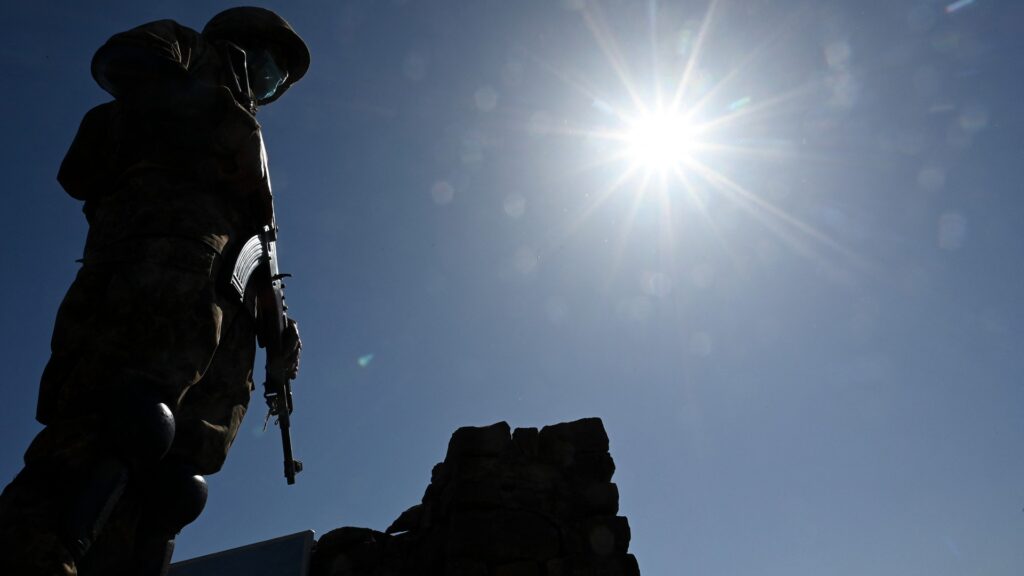Pakistan says it has credible intelligence that a military incursion by India was “imminent” in the aftermath of a deadly attack by gunmen on a group of tourists in India-administered Kashmir that killed 26 people earlier this month.
“We have reinforced our forces because it is something which is imminent now. So in that situation, some strategic decisions have to be taken, so those decisions have been taken,” Pakistan’s Defence Minister Khawaja Muhammad Asif said during an interview in Islamabad on Tuesday, and was reiterated by Pakistani officials on Wednesday during a press conference.
Late on Tuesday, Pakistan’s Federal Minister for Information and Broadcasting Ataullah Tarar expanded on the announcement in a post on X, saying that Pakistani intelligence predicts an attack by India in the “next 24-36 hours on the pretext of baseless and concocted allegations of involvement in the Pahalgam incident”.
“Pakistan reiterates that any such military adventurism by India would be responded to assuredly and decisively. The International community must remain alive to the reality that the onus of escalatory spiral and its ensuing consequences shall squarely lie with India,” Tarrar added.
The past few days have already seen an exchange of fire between the countries’ forces across the Line of Control (LoC), the de facto border between Pakistan-administered and India-administered Kashmir.
New MEE newsletter: Jerusalem Dispatch
Sign up to get the latest insights and analysis on
Israel-Palestine, alongside Turkey Unpacked and other MEE newsletters
On Wednesday, Pakistani state media reported that four Indian Rafale jets were spotted patrolling India-administered Kashmir, without crossing the LoC, and after Pakistan scrambled its jets, the Indian jets retreated.
Pakistan also claimed to have shot down an Indian spy drone, or “quadcopter”, on Tuesday.
The Indian government immediately named Pakistan as being behind the attack in the tourist hub of Pahalgam in Indian-administered Kashmir on 22 April. Pakistan has vehemently denied any involvement in the attack.
Initially, a group called the Resistance Front (TRF) claimed responsibility for the attack, but later “unequivocally” denied any involvement in the attack.
TRF is a group founded in Indian-administered Kashmir, engaged in an insurgency against the Indian state, opposing its control of the territory. The Indian government believes the group is linked to Pakistan’s Lashkar-e-Taiba, an armed group in Pakistan whose stated aim is to merge Kashmir with Pakistan.
The mountainous Kashmir region has been disputed since the partition of India and Pakistan in 1947, with India claiming the region as “integral” to its sovereignty and Pakistan calling for a plebiscite, including Pakistan-administered Kashmir, to give Kashmiris the right to self-determination.
Both countries accuse the other of occupying the region.
India has often blamed homegrown Kashmiri separatist groups for having links to Pakistan’s intelligence agencies.
Blame game
The Pakistan government has asked the Indian authorities to present evidence over its alleged involvement in the attack and has said it welcomes a credible and transparent investigation by a “neutral commission of experts” to determine who is behind the attack.
On Tuesday, Indian Prime Minister Narendra Modi chaired a meeting with all the chiefs of his army staff and other security agency heads, authorising them to use force against Pakistan.
According to reports from the meeting, Modi gave India’s armed forces “complete operational freedom to decide on the mode, targets and timing of our response to the terror attack”.
On Wednesday, Pakistani officials held a joint press conference featuring Pakistani Deputy Prime Minister and Foreign Minister Ishaq Dar; Inter-Services Public Relations (ISPR) director general Lieutenant General Ahmed Sharif Chaudhry; and Foreign Office spokesperson Shafqat Ali Khan to address the tensions between the two countries.
Dar said that Pakistan will exercise “restraint” for the sake of regional peace.
“Pakistan will exercise restraint for the purpose of regional peace. But if provoked, any action from the other side will be responded to in a befitting manner, and in a stronger way,” Dar said.

Kashmir: At least 26 killed after gunmen open fire on tourists
Read More »
The Pakistani officials used the press conference to cast doubt on what they were calling an exercise in “narrative building” surrounding the attack in Pahalgam.
The ISPR’s Chaudhry showcased maps and a timeline of the attack that took place in Pahalgam, questioning India’s narrative on the incident. Chaudry told Pakistani journalists that the attack started at 1:50pm local time until 2:20pm. He then showed a slide of the First Information Report – a legal document filed in a police station in South Asia and Southeast Asia that is the first official record of a crime reported to the police – being filed at 2:30pm local time.
A picture of the report shows that within 10 minutes of the attack taking place, “handlers across the border” were named in the report, referring to Pakistan.
Chaudhry rhetorically asked journalists in the room how it was possible that, despite Indian intelligence being “flat” enough to allow an attack to take place in the most militarised region on earth, Indian intelligence could then determine that the attackers came from Pakistan within ten minutes of it having ended.
Kashmir has been dubbed “the world’s most militarised zone” because of the outsized presence of Indian paramilitary forces in the region.
Pakistani officials emphasised at the press conference that they will not be the first to attack India and that “conventional warfare” between the two countries was unlikely, given that both countries possess nuclear weapons.
But Pakistani officials left the door open to retaliation.
“There will be decisive and assured actions. Rest assured, the people of Pakistan will defend the territorial integrity and sovereignty of Pakistan at all costs,” Chaudhry said.

